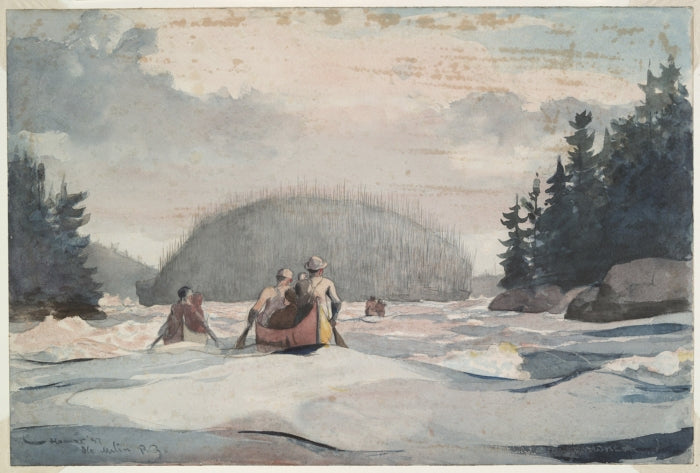Opis
Winslow Homer's painting "Malin Island" (Ile Malin) is one of the most representative works of the talent and artistic vision of this outstanding 19th-century American painter. Known for his ability to capture the subtleties of light and nature, Homer composes in this piece an evocative view of the seascape. At first glance, the elements of the composition invite the viewer to a visual exploration that reveals both the majesty of nature and the fragility of the human being.
The color palette used in “Malin Island” is rich and varied, dominated by deep blue hues evoking the vastness of the ocean and sky, intertwined with shades of greens and beiges representing the island itself. The way these colors intertwine suggests an atmosphere of serenity, while at the same time hinting at the strength of the natural forces surrounding the scene. These color choices are not accidental; they reflect Homer’s quest to communicate a visceral connection between the human and the natural environment.
The composition is characterized by a focus on simplicity and balance. The island, situated in the background, seems to exemplify solitude, while the sea surrounding it adds a sense of movement and life. The way the waves gently crash suggests a constant dialogue between land and water, a recurring theme in Homer's work. Through this interaction, a narrative about coexistence and the vulnerability of beings in the face of the immensity of the natural landscape is glimpsed.
Despite the apparent stillness of the scene, a latent tension is felt, suggesting that the calm of the moment is only superficial and that powerful forces of the sea are at play. This tension is particularly characteristic of Homer's style, who often used his art to reflect the human relationship to nature, with a focus on the sublime and spectacular of the environment.
As for the characters, "Malin Island" features no human figures, allowing the landscape to speak for itself. The absence of figures highlights Homer's focus on nature and allows the viewer to project their own interpretations and emotions onto the scene. This choice also resonates with contemporary art movements of its time, in which nature often took a starring role, leaving the human figure as a rather symbolic inclusion, if it appeared at all.
Beyond its aesthetics, Malin Island is part of a larger corpus that outlined Homer's evolution as an artist. His experiences in places like the coast of Maine and his travels through Europe deeply influenced him, and this particular work is located within his exploration of seascapes and rural landscapes. Homer's ability to capture light and weather is often evident in similar works, such as The Storm or The Lobster Fishers, where the sea and its inclement weather are the undisputed protagonists.
"Malin Island" is not just a visual representation; it is an invitation to reflect on the place of the human being in the vast context of nature. The work encapsulates Homer's desire to transcend the everyday, opening a dialogue that invites a deeper contemplation of the eternal and the ephemeral. As a whole, it is a testament to Homer's virtuosity and his inescapable connection with the landscape that surrounded him, making him a fundamental figure in the history of American art.
KUADROS ©, a famous painting on your wall.
Hand-made oil painting reproductions, with the quality of professional artists and the distinctive seal of KUADROS ©.
Painting reproduction service with satisfaction guarantee. If you are not completely satisfied with the replica of your painting, we will refund 100% of your money.

